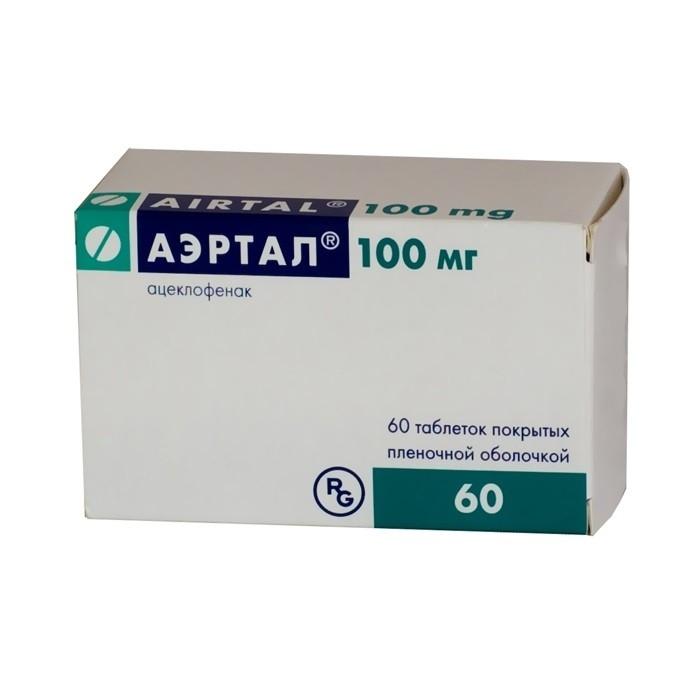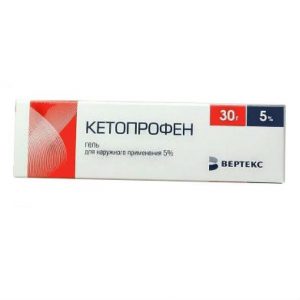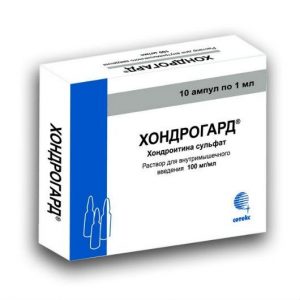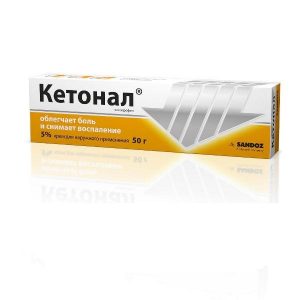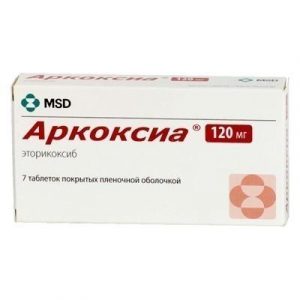Description
Latin name
Airtal
Release form
Film-coated tablets.
packaging 60 pcs 0.1 g each
Pharmacological action
Aceclofenac has anti-inflammatory, analgesic and antipyretic effects. Inhibits the synthesis of GHG, etc. affects the pathogenesis of inflammation, the onset of pain and fever. In rheumatic diseases, the anti-inflammatory and analgesic effect of aceclofenac significantly reduces the severity of pain, morning stiffness, swelling of the joints, which improves the patient s functional state.
Indications
Treatment of pain in osteoarthritis, rheumatoid arthritis and ankylosing spondylitis, as well as other diseases of the musculoskeletal system (eg, brachiocephalic periarthritis).
As an anesthetic (including lumbago, toothache and primary dysmenorrhea).
Contraindications
Hypersensitivity to aceclofenac or any of the components of the drug.
Patients with drugs with a similar effect (for example, acetylsalicylic acid or other NSAIDs) have caused attacks of bronchial asthma, bronchospasm, acute rhinitis or urticaria, or in the presence of hypersensitivity to these drugs.
Acute or recurrent peptic ulcer of the stomach or duodenum or the presence of these diseases in the anamnesis, gastrointestinal bleeding, bleeding of a different genesis.
Acute heart failure or severe hepatic or renal impairment (creatinine Cl less than 30 ml / min).
The period after coronary artery bypass grafting.
Crohn’s disease, ulcerative colitis.
Pregnancy.
Lactation.
Age to 18 years.
With caution: a history of liver, kidney and gastrointestinal diseases bronchial asthma dyspeptic symptoms at the time of administration of the drug arterial hypertension decreased BCC (including immediately after extensive surgery) coronary heart disease chronic renal, hepatic and heart failure Cl creatinine <60 ml / min anamnestic data on the development of gastric ulcer, presence of Helicobacter pylori infection cerebrovascular disease dyslipidemia / hyperlipidemia diabetes mellitus peripheral artery disease smoking old age long-term use of NSAIDs diuretics use frequent alcohol heavy severe somatic diseases. Use during pregnancy and lactation The drug is contraindicated during pregnancy. Regular use of NSAIDs in the last trimester of pregnancy can lead to decreased tone and weaker uterine contractions. The use of NSAIDs can lead to premature closure of the Botallov duct in the fetus and possibly to prolonged pulmonary hypertension in the newborn, a delay in the onset of labor and an increase in the duration of labor. Aertal should not be taken during lactation. There are no data on the allocation of Aertal with human milk. Composition 1 tablet contains: Active ingredient: aceclofenac 100 mg. Excipients: MCC – 89.2 mg povidone – 6.6 mg glyceryl distearate type I – 2.6 mg croscarmellose sodium – 6.6 mg film coat: Sepifilm 752 white (hypromellose, MCC, macrogol stearate type I, titanium dioxide ) – 9 mg. Dosage and Administration Inside. Film-coated tablets are swallowed whole with a sufficient amount of liquid. Adults: usually 1 tablet. (100 mg) 2 times a day: 1 tab. in the morning and 1 in the evening. Elderly: dose adjustment usually not required. Hepatic insufficiency: patients with moderate hepatic impairment should reduce the dose of aceclofenac. The recommended initial dose is 100 mg daily. Renal failure: There is no evidence that aceclofenac should be reduced in patients with mild renal failure, but caution is advised. Side effects The adverse effects listed below are presented in the organ-system classes according to the MedDRA classification with the following frequency: Often – 1/100 to <1/10. Infrequently – 1/1000 to <1/100. Rarely – 1/10000 to <1/1000. Very rare – <1/10000. From the blood and lymphatic system: rarely – anemia is very rare – bone marrow depression, granulocytopenia, neutropenia, hemolytic anemia. From the side of the immune system: rarely – anaphylactic reaction (including shock), hypersensitivity. From the side of metabolism and nutrition: very rarely – hyperkalemia. Mental disorders: very rarely – depression, unusual dreams, insomnia. From the nervous system: often – dizziness is very rare – paresthesia, tremors, drowsiness, headache, dysgeusia. From the side of the organ of vision: rarely – visual disturbances. On the part of the organ of hearing and the labyrinth: very rarely – vertigo, ringing in the ears. From the CCC side: rarely – heart failure, arterial hypertension, aggravated arterial hypertension very rarely – tachycardia, hot flashes, vasculitis. From the respiratory system, chest and mediastinal organs: rarely – shortness of breath very rarely – bronchospasm. From the gastrointestinal tract: often – dyspepsia (7.5%), abdominal pain (6.2%), nausea (1.5%), diarrhea (1.5%) infrequently – flatulence, gastritis, constipation, vomiting, mucosal ulcer rarely – melena, gastrointestinal ulcer, diarrhea with blood, gastrointestinal bleeding very rarely – stomatitis, vomiting of blood, gastric ulcer, perforation of the small intestine, worsening of Crohn’s disease and ulcerative colitis, pancreatitis. From the side of the liver and biliary tract: often – an increase in the activity of liver enzymes is very rare – damage to the liver (including hepatitis), an increase in the activity of alkaline phosphatase. From the skin and subcutaneous tissue: infrequently – itching, rash, dermatitis, urticaria rash rarely – angioedema very rare – purpura, eczema, reactions from the skin and mucous membranes, bullous skin reactions, including Stevens-Johnson syndrome and acute epidermal necrolysis . From the kidneys and urinary tract: infrequently – increased blood urea concentration, increased blood creatinine concentration is very rare – interstitial nephritis, nephrotic syndrome, renal failure. General disorders and disorders at the injection site: very rarely – swelling, weakness, muscle cramps, weight gain. Overdose Symptoms: headache, dizziness, hyperventilation with high convulsive readiness, abdominal pain, nausea, vomiting. Treatment: gastric lavage, activated charcoal administration, symptomatic therapy are indicated. There is no specific antidote to the drug. Forced diuresis, hemodialysis are ineffective. Storage conditions Store at a temperature not exceeding 25 ° C. Keep out of the reach of children. Expiration 3 years. dosage form srdl kp Dosage form tablets Almiral S.A., Spain
